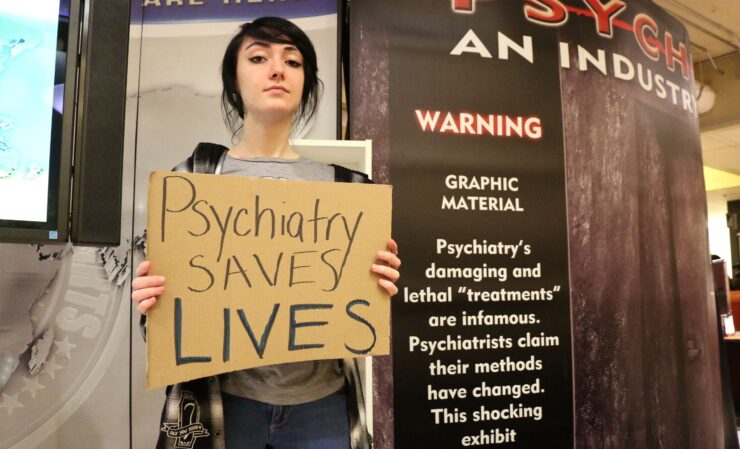Group of students launches petition calling for the university to ban Church of Scientology from campus
Content warning: Suicide
Hundreds of University of Ottawa students are condemning a Scientology linked anti-psychiatry exhibit that is being shown all week in the University Centre (UCU), with some calling on the university to relocate or remove the display altogether.
The 14-panel exhibit, titled “Psychiatry: An Industry of Death”, was installed earlier this week by the Citizens Commissions on Human Rights (CCHR), an international non-profit organization established in 1969 by the Church of Scientology.
“What (the exhibit) does is it provides people with information regarding psychiatric diagnoses and psychiatric treatment,” said Robert Dobson-Smith, the president of CCHR Canada.
According to their website, the CCHR is a “mental health watchdog” that has “taken a stance against the biological/drug model of ‘disease’ that is continually promoted by the psychiatric/pharmaceutical industry as a way to sell drugs.”
“This epidemic of mental illness that’s coming is from the epidemic of people being prescribed drugs, and having adverse reactions to them,” alleged Dobson-Smith. One 2018 international study focusing on 21 commonly-used antidepressants and nearly 120,000 patients found that all of the drugs studied were more effective in relieving acute depression than placebos.
The exhibit — which features panels such as “Inventing Disorders to Sell Drugs” and “Hooking the World on Drugs” — was set up just days after the university finished celebrating its annual Wellness Week. The exhibit also comes less than two months after a wave of students and thousands of petition signers demanded better mental health services from the university in the wake of four student deaths in a year.
“If the university administration wants to be taken seriously on addressing the major issues that we have on campus on dealing with mental health, then they need to prioritize that,” said Tim Gulliver, a second-year political science student and member of the University of Ottawa Students’ Union’s (UOSU) Board of Directors.
Emma Copeland, a third-year conflict studies and human rights student, has been protesting outside the exhibit with her friends since Tuesday morning and said that the display further isolates students who use medication to treat their mental illnesses.
“Students might walk past something like this and say… ‘Clearly, I’m doing something wrong, and I should go off my meds, or my mental illness is a danger to society,’ ” said Copeland.
“And then that person goes off their meds and they stop seeing their therapist, and they withdraw from society because their mental illness gets worse,” she said. “Then it ends in someone getting very, very, very hurt or very sick, or unfortunately (dying by suicide), as we’ve seen is a trend on this campus.”
After four student deaths in 2019, Gulliver described the exhibit as “extremely harmful.”
“When you’re trying to build upon this culture around mental health on campus, it’s important that we ensure that students are constantly exposed to that positive culture,” said Gulliver. “It seems extremely inappropriate for the university administration to … allow a group that is promoting very dangerous rhetoric — and even on occasion, I might say it’s hate speech — on campus.”

In a written statement, CUPE 2626, the union representing student workers at the U of O, expressed their support for Copeland and the other students mobilizing against the display.
“We echo their concerns that such a display is detrimental to the well-being of those on the U of O campus, and we invite folks to take a look at their petition,” wrote the union.
The petition, which was launched by Copeland’s friend and fellow U of O student Avery Monette, is calling on the university to ban the exhibit and its organizers from campus.
“The presence of this group on campus also reflects poorly on the U of O in general, considering that they are still present in the UCU, which gets a high volume of student traffic every day,” states the petition, which has been signed by more than 500 people.
Students are also planning a peaceful protest for Wednesday from 1 to 7 p.m., with the goal of organizing a human chain “to spread a positive, healthy and scientifically accurate message on mental health,” according to the Facebook event.
Dr. Kathleen Pajer, chair of the department of psychiatry in the U of O’s faculty of medicine, said that she is looking into why the university decided to approve and host the exhibit in the first place.
“The Church of Scientology has the right to believe whatever they believe … but it’s quite a bit of distortion of the truth,” said Pajer. “It needs to be sorted out — who and why decided such a unilateral presentation would be in the interest of the university’s intellectual goals.”
Isabelle Mailloux Pulkinghorn, the U of O’s media relations manager, said via email that the university does not support the views expressed in the exhibit.
“Neither the acceptance of a request for the temporary use of a university space nor the holding of the activity in a university space shall be construed as a university endorsement,” she wrote. “The mental health and well-being of our students, staff and faculty (are) of paramount importance to the U of O”
In a statement, the UOSU said it “will also follow up with the university on the display of disruptive elements on campus” but did not take a position on the exhibit.
According to Dobson-Smith, the university “graciously” approved the exhibit, and he praised the school’s policy on freedom of speech, which outlines that the U of O “neither seeks to shield its community from controversial or objectionable views nor permits interference with the free expression of the full spectrum of human thought.”
Copeland, however, said that the goal is to have the exhibit removed, not to refute CCHR’s right to free speech.
“It’s inappropriate to have them on our campus,” she said.
Mailloux Pulkinghorn did not comment on whether there were any plans to remove the exhibit from campus.
— With files from Matt Gergyek, Zoë Mason & Jonathan Di Carlo
More to come.





